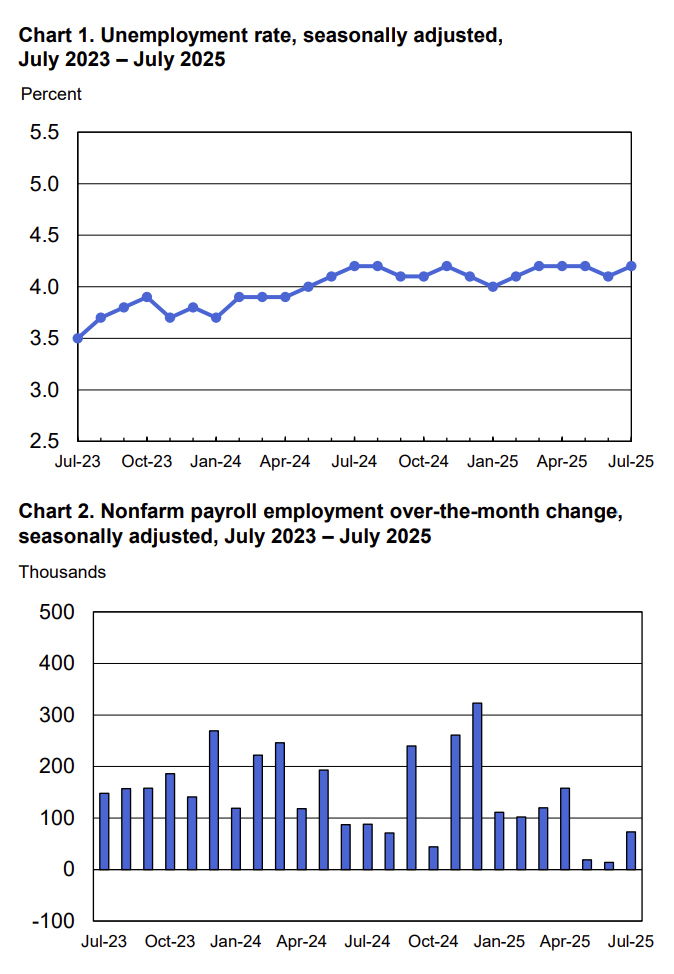 “Every month’s Bureau of Labor Statistics Employment Situation Summary (BLS) is pored over by economists to look for evidence of new and emerging labor force trends. While today’s numbers did not introduce any new narratives, it did reinforce a theme our company has seen throughout 2025.
“Every month’s Bureau of Labor Statistics Employment Situation Summary (BLS) is pored over by economists to look for evidence of new and emerging labor force trends. While today’s numbers did not introduce any new narratives, it did reinforce a theme our company has seen throughout 2025.
Amid a backdrop of emerging tariff clarity, the passage of the administration’s mega-bill and evolving ICE strategies, the BLS reported non-farm payrolls rose by 73,000 in July, and unemployment was little changed at 4.2 percent. Of note, the BLS reported significant revisions in May and June. With these revisions, employment for those months is 258,000 lower than previously reported,” noted Rick Hermanns, president and chief executive officer of HireQuest.
“A constant theme this year across our network of over 450 offices is that the overall employment marketplace is growing but not as a single entity. We see significant geographic, demographic and skills-based patterns in job growth.
We agree with a recent The Wall Street Journal article. It’s not just the big coastal metros drawing in talent. Cities like Raleigh, Milwaukee, and Birmingham are emerging as vibrant hubs where young professionals, especially Gen Z grads are kickstarting their careers.
At HireQuest, we see this shift every day across our national footprint. Through our specialized divisions like MRINetwork and Snelling Staffing, we help connect new grads with meaningful opportunities in growing markets whether they’re seeking their first role or planning a longer-term career path. These smaller cities offer more than just job openings, they offer community, affordability, and a chance to make an impact early.
On a more granular level, our recruitment professionals continue to see steady hiring demand for seasoned talent broadly in healthcare, in key financial / banking sectors, particularly in areas like private equity and asset management and in construction across certain regional areas.”
Wall Street Journal reporter Rachel Wolfe provided insight into today’s data, suggesting a new post-immigration normal, “Economists are paying particular attention to changes in the supply of workers. A dramatic decrease in border crossings is constraining the number of people from abroad coming into the labor force. High-profile immigration raids are keeping many workers at home. Meanwhile, the U.S. is aging, boosting retirements and limiting the number of younger people joining the workforce. A year and a half ago, the economy needed to add 166,000 jobs a month to keep the labor market steady, according to Peterson Institute for International Economics senior fellow Jed Kolko. As of June, Kolko said, the needed number was only 86,000.”
Key industries reported the following trends in July 2025:
Total nonfarm payroll employment changed little in July (+73,000) and has shown little change since April.
In July, healthcare added 55,000 jobs, above the average monthly gain of 42,000 over the prior 12 months. Over the month, job gains occurred in ambulatory healthcare services (+34,000) and hospitals (+16,000).
Social assistance employment continued to trend up in July (+18,000), reflecting continued job growth in individual and family services (+21,000).
Federal government employment continued to decline in July (-12,000) and is down by 84,000 since reaching a peak in January. (Employees on paid leave or receiving ongoing severance pay are counted as employed in the establishment survey.)
Employment showed little change over the month in other major industries, including mining, quarrying, and oil and gas extraction; construction; manufacturing; wholesale trade; retail trade; transportation and warehousing; information; financial activities; professional and business services; leisure and hospitality; and other services.
“Our HireQuest franchise model with a global network of experts ranging from local hands-on talent recruiters in Snelling and HireQuest Direct, and our in-depth industry-focused expertise among our MRINetwork owners provide a powerful platform to help our clients grow in any business environment. Whether it is assisting top Gen Z talent as they reshape the workforce or sourcing tenured executive, technical, professional and managerial leaders to lead business transformation, the HireQuest business model encourages owners to meet client needs efficiently as we pivot and lean into changing high-demand skill-set and geographic demands,” noted Hermanns.

Connect with MRINetwork